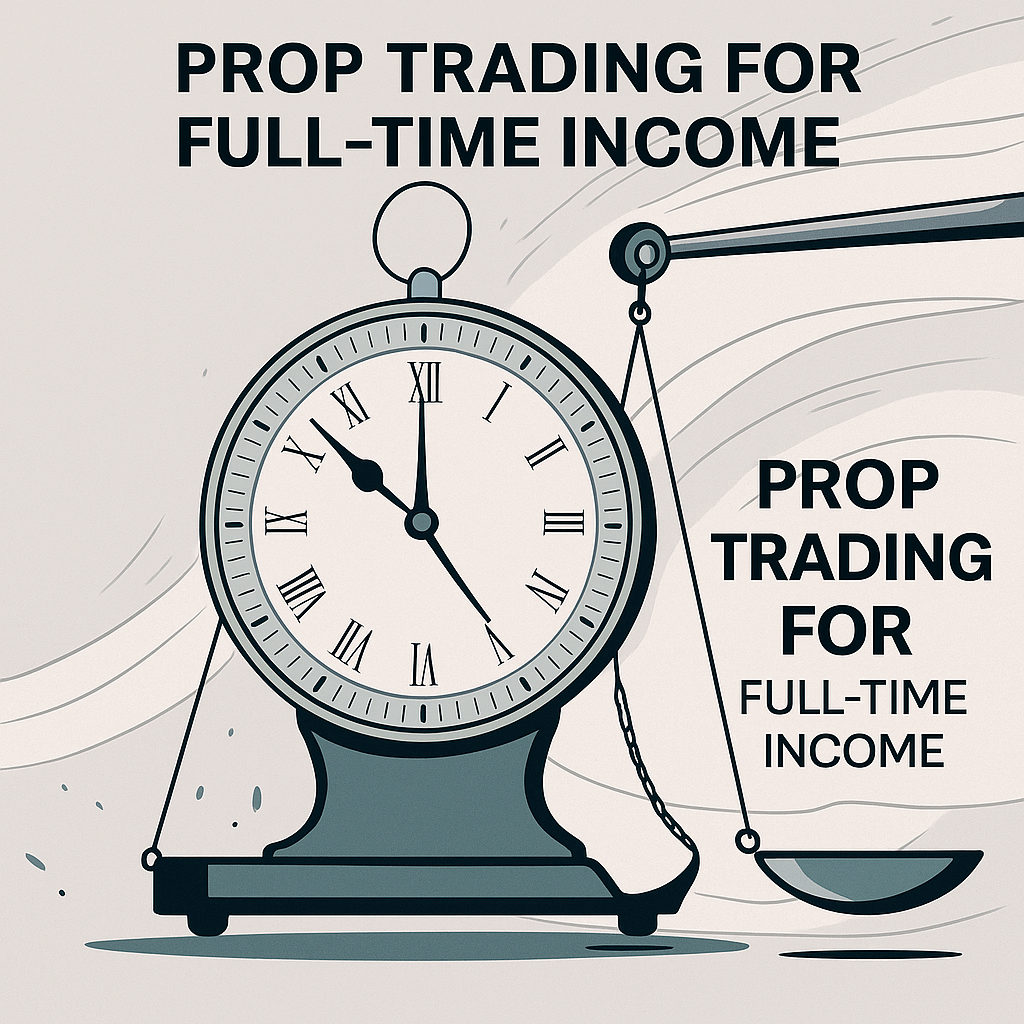Can You Make a Full-Time Income from Prop Trading?
In today’s digital trading environment, many traders ask if it’s truly possible to rely on prop trading for full-time income. With access to funded accounts, flexible schedules, and advanced trading platforms, the appeal of replacing a traditional job with trading is stronger than ever. But just how realistic is it?
Let’s explore what it takes to achieve consistent earnings through proprietary trading and whether it can become a dependable primary income source.
Understanding the Prop Trading Model
Before evaluating its potential as a full-time career, it’s important to understand the mechanics of proprietary trading. Prop trading involves trading with capital provided by a firm rather than your own money. Traders typically undergo an evaluation phase, meet performance targets, and—once funded—receive a share of the profits.
This model is attractive because it minimizes personal financial risk. However, it also introduces specific rules, profit-sharing structures, and performance standards that must be maintained.
Key Factors That Impact Full-Time Income from Prop Trading
Success in generating a full-time income from prop trading depends on multiple elements. These include consistency, discipline, and strategy. Below are the core components every trader must master:
1. Consistency Over Time
One winning month isn’t enough. Traders aiming for full-time income need to demonstrate consistent profitability over many months. This involves adapting to market changes and avoiding large drawdowns.
2. Risk Management Discipline
Preserving capital is as important as making profits. Without structured risk management, traders may lose funded accounts or fail to qualify for withdrawals. Setting clear limits per trade, using stop-losses, and maintaining proper position sizing are all vital practices.
3. Strategy Adaptability
Markets evolve. A strategy that works well in one market phase may underperform in another. Full-time traders must be willing to test, revise, and adjust their methods without overreacting emotionally.
4. Profit Payouts and Scaling
Most prop firms offer tiered payout systems. Traders who prove themselves can often scale up to larger accounts, increasing earning potential. Withdrawing profits regularly while reinvesting a portion into trading can help build stable income streams.
Realistic Expectations: How Much Can You Earn?
Setting realistic expectations is critical. While some traders do achieve full-time income, others may generate part-time earnings or experience inconsistent results.
Key variables that affect income potential include:
-
Account size
-
Profit split ratio
-
Frequency of payouts
-
Market volatility
-
Time committed to trading
For instance, a trader managing a mid-sized funded account with consistent monthly returns can realistically aim to replace an average salary. However, income may vary due to market conditions or changes in personal performance.
Is Prop Trading for Full-Time Income Sustainable Long-Term?
One of the biggest concerns for aspiring full-time traders is sustainability. Even profitable strategies can experience drawdowns or dry spells. Therefore, long-term sustainability depends on more than technical skill.
Emotional Resilience
Full-time trading can be mentally taxing. Handling the emotional highs and lows of the market, staying focused, and sticking to a routine all play crucial roles in maintaining performance.
Financial Buffer
Even with funding, traders should avoid relying on every payout. Keeping a savings buffer to cover personal expenses during slower months provides stability and reduces stress.
Ongoing Education
Successful traders invest in their growth. Market conditions evolve, and staying ahead requires continuous learning—whether through backtesting, mentorship, or new strategies.
Advantages of Using Prop Trading for Full-Time Income
While challenges exist, there are clear advantages that make full-time prop trading attractive:
-
No capital requirement: You don’t need to invest your own money upfront.
-
Low overhead: No need for office space or physical inventory.
-
Location freedom: Trade from anywhere with internet access.
-
Scalability: Earn more by trading larger funded accounts as you grow.
These benefits allow traders to build a flexible, self-directed career—something that’s difficult to find in many traditional job paths.
Using Prop Trading for Full-Time Income: Is It Right for You?
Assess Your Personality
Full-time trading isn’t for everyone. Do you perform well under pressure? Can you stay motivated without external structure? Are you disciplined in following your trading plan?
Evaluate Your Progress
Track your historical performance over time. Do your metrics show steady growth, controlled drawdowns, and consistent gains? If so, scaling up might be the next logical step.
Consider a Gradual Transition
Rather than quitting your job immediately, consider transitioning slowly. Start by trading part-time, build a financial cushion, and increase your hours as your profits stabilize. Many successful traders take this route to reduce pressure and increase success rates.
One Subtitle with Keyword:
Is Prop Trading for Full-Time Income a Viable Career Path?
In summary, prop trading for full-time income is achievable—but it’s not guaranteed. It requires a strong foundation in trading skills, emotional discipline, and risk management. Many traders begin their journey with part-time ambitions and gradually grow into a full-time role. Others use trading as a way to supplement income, enjoy flexibility, or build long-term wealth.
If you’re considering this path, take time to evaluate your goals, track your performance, and invest in your trading education. And remember, with the right approach and mindset, trading can become not just a source of income, but a full-time profession with freedom and potential.

